|
2 East Hill
Dartford
https://whatpub.com/eleven-cricketers
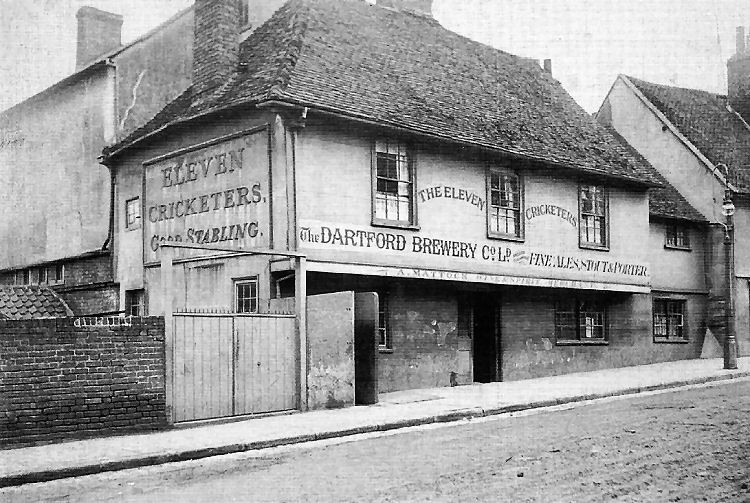
Above photo showing the original pub circa 1890, kindly sent by Michael Norman. |
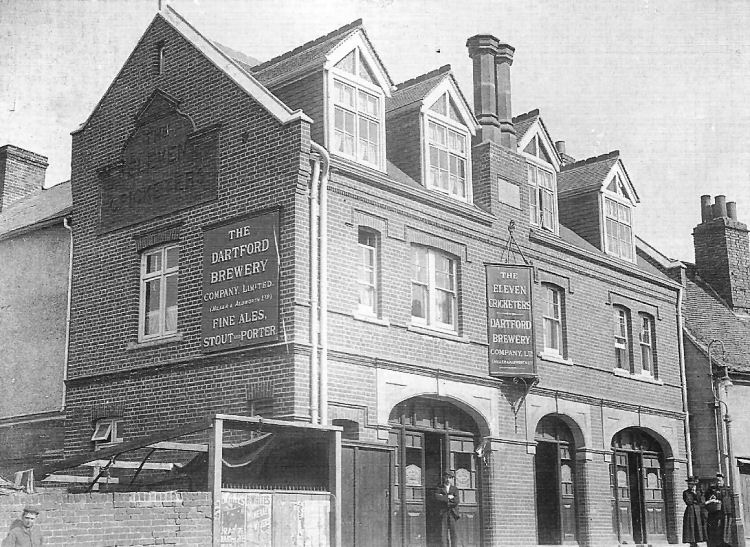
Above photo, circa 1900, kindly sent by Michael Norman. |
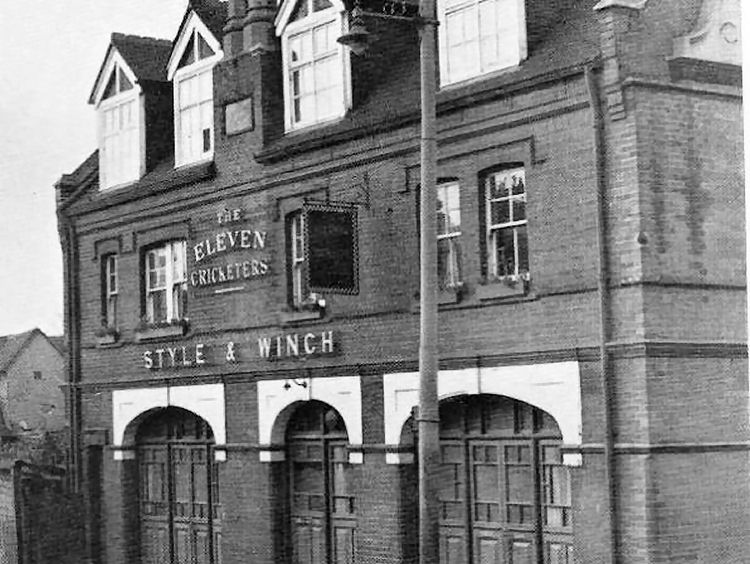
Above photo, date unknown. |
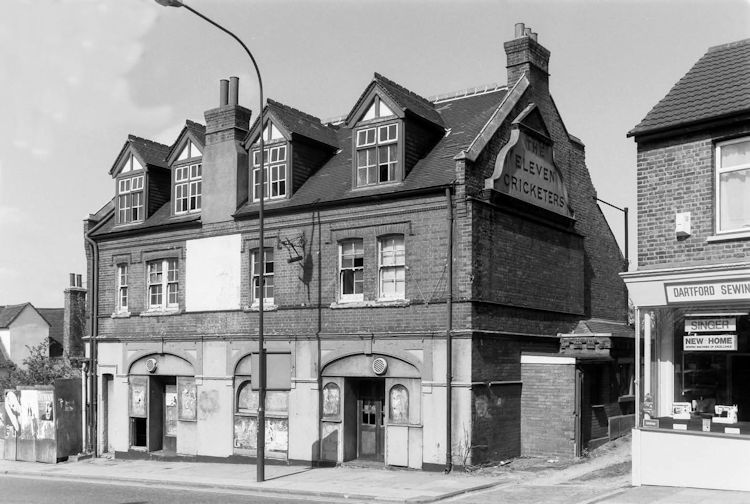
Above photo, 1995. |
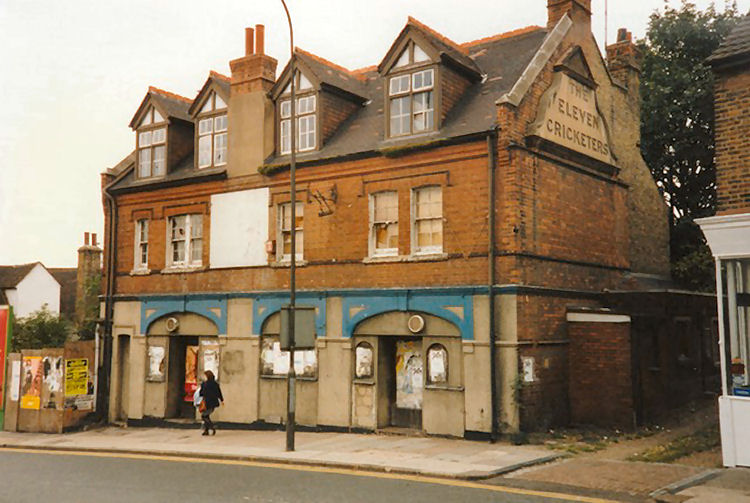
Above photo, April 1997, kindly sent by Philip Dymott. |

Above photo, date unknown, kindly sent by Brian Brockie. |

Photos taken on 20 February, 2009 from
http://www.flickr.com
by Dave Dunmall. |
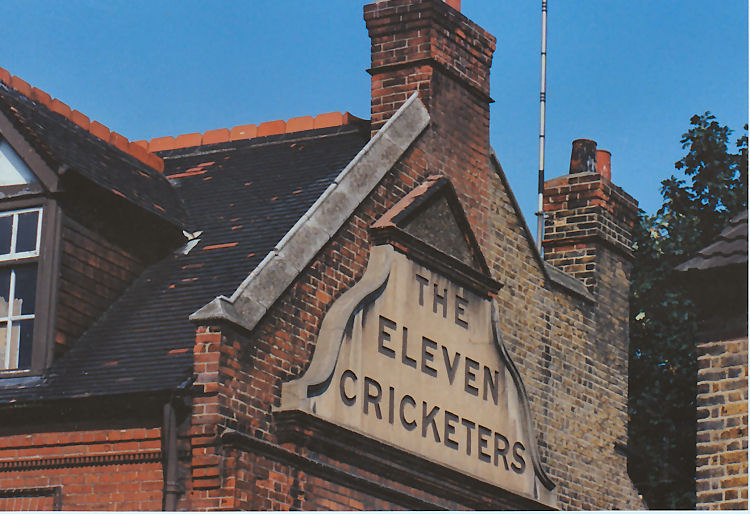
Above sign August 1991.
With thanks from Brian Curtis
www.innsignsociety.com.
|
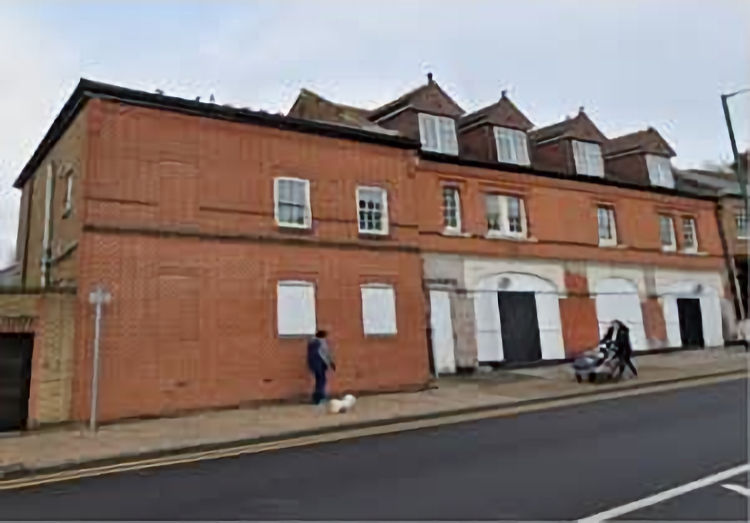
Above photo, circa 2024. |
The "Eleven Cricketers" is built on the site of the "Queens
Head" which had existed as long ago as 1700. The pub was renamed in 1778
to commemorate the first ever cricket match played in England (in 1709).
Owned by famous cricketer John Bell in 1760 and frequented by other
cricketers of the time.
John Bell (born in 1718 at Dartford in Kent; died at Dartford in January
1774) was a noted English cricketer of the mid-Georgian period at a time
when the single wicket version of the game was popular. He was an
accomplished wicket-keeper with Dartford and Kent who also played many times
for All-England teams.
John Bell's occupation was probably shoemaker, a trade known to have been
followed by several of his family. But in 1760 he took over the "Eleven
Cricketers" public house on East Hill in Dartford, remaining there till his
death in January 1774 at the age of fifty-five. A few days later the
newspaper Bingley's London Journal referred to him as "the most noted
cricketer in England".
Thomas Bell, brother of John, also played for Dartford and All-England.
In 1762, Thomas Bell was condemned to death at Maidstone Assizes for highway
robbery, but was later reprieved. Nothing more is known of him.
This was a tied "Fleet Brewery"
pub in 1865 when the brewery was put up for auction.
The original building was demolished just before the turn of the 20th
century and a new building we see today built, I believe, on the same site.
The pub closed in 1988.
I believe the premises has been converted into the "Abbey Hotel."
See Dartford Map 1905. The pub was referred to simply as the
"Cricketer's" on the 1905 map.
|
Morning Herald 17 February 1837.
"On Wednesday evening, while the Eagle Coach to London was descending
Dartford Hill, the fore axletree suddenly broke, and threw the coach
over. Fortunately no lives were lost. The passengers were principally
sailors, who had just been paid off from the Castor Frigate, at Chatham.
One of them, whose name is John Dunn, was severely bruised, and lost his
hat and shoes. He with the others, went into the "Eleven Cricketers"
public house, and in about an hour the coach was repaired, but when
ready to start Dunn could not be found, and he was left behind. On the
following morning, it was discovered that he had become insensible, and
that a female of disreputable character had taken him to a room in a
by-place, and robbed him of a red silk purse, containing 34 five pound
notes, and one 10 pounds, all Bank of England; among them are No 18,401,
20 Dec 1836, and No 20,351, 21 Dec 1836; also a red cotton purse,
containing 33 sovereigns. The man was not sensible until 7 or 8 hours
after the robbery, during which time the woman and her paramour got off
with the property, and no tidings have been heard of her. £20 reward is
offered for her apprehension - Maidstone Journal of Tuesday."
|
|
Canterbury Weekly, 18 February, 1837.
On Wednesday evening, while the Eagle coach to London, was
descending Dartford Hill, the fore axletree suddenly broke, and
threw the coach over. Fortunately, no lives were lost. The
passengers were principally sailors who had just been paid off from
the Castor Frigate, at Chatham. One of them, whose name is John
Dunn, was severely bruised, and lost his hat and shoes. He, with the
others, went into the "Eleven Cricketers" public house, and in
almost an hour the coach was repaired, but when ready to start, Dunn
could not be found, and he was left behind. On the following morning
it was discovered that he had becoming insensible, and then a female
of disreputable character had taken him to a room in a bye place,
and robbed him of a red silk purse, containing 34 five-pound notes,
and one £10 note Bank of England. Among them are number 18,401, 20th
December 1836 and number 20,351, 21st December, 1836; also a red
cotton purse containing 33 sovereigns. The woman goes by the name of
Nancy Weyman and lives with Tom Weyman, a brick maker, Tom Bricks
(well-known at Northfleet,) and who assisted her in the robbery. The
man was not sensible until 7 or 8 hours after the robbery; during
which time they got off with the property, and no tidings have been
heard of them.
£20 reward is offered for the apprehension.
Greenwich Gazette.
|
|
Bells New Weekly Messenger 5 March 1837.
Robbing a Sailor (Central Criminal Court).
"Thomas Weyman, labourer, aged 25; Charles Haydon, butcher, aged 21;
Hannah Hawkins, spinster, aged 22; and Jane Gill, aged 20, were indicted
for stealing at Dartford, 2 purses, containing £213 in bank notes and
sovereigns, the property of John Dunn. It appeared from evidence of the
prosecutor, a midshipman's steward, attached to the Castor frigate, that
on the 8th of February he left Chatham by stage coach for the purpose of
proceeding to London. In passing through Dartford the coach upset, and
he was thrown from the top, and was conveyed in a state of insensibility
to a public house. He had in his possession at the time the two purses
and money named in the indictment, having been paid off that day at
Chatham with the rest of the ship's crew. On coming to his senses, he
inquired for a lodging, and sailor-like, incautiously exhibited his money
to the persons who were present, amongst whom were the two female
prisoners, who it appeared, had followed the prisoner to the house, and
had been very active in the crowd when the coach upset. The woman
Hawkins offered to accommodate the prosecutor with a bed for the night,
to which he agreed, and accompanied her lodging, where she left him,
telling him that she was going to her husband. The prosecutor went to
bed, having placed his trousers, in the pocket of which his money was
deposited, beside the bed. On awaking in the morning he found his
trousers on the floor, and then discovered that the whole of his money
was gone. He gave information of the robbery to a constable, and upon
enquiry it appeared that the 4 prisoners were ferried across the river
in the course of the night by a brother of the prisoner Weyman, who
received 2 sovereigns for the job, the prisoner Gell boasting at the
time that they had £500 in their possession. The prisoners were
subsequently apprehended at Uxbridge, when the two purses belonging to
the prosecutor and a considerable sum of money were found in the
possession of Weyman, Haydon, and Hawkins, who, with the prisoner Gell,
were proved to have been in company together at Dartford on the night of
the robbery, when Hawkins was heard to declare her intention to rob the
sailor before morning. It appeared also that the two male prisoners
after they were in custody had a quarrel respecting the division of the
booty. The defence of the woman Hawkins was, that the prosecutor gave
her the whole of the money, declaring that he would live with her
forever and desert his wife and children if she would agree to marry
him. This statement, however, was emphatically denied by the prosecutor.
The notes found in the possession of the prisoner, were proved by a
clerk in the Bank of England to form part of a sum of money which had
been transmitted to Chatham on the order of Sir Henry Parnell for the
purpose of paying off the crew of the Castor frigate, and the two purses
also found on the prisoners were identified by the prosecutor as his
property. The jury found the prisoners guilty. The Recorder directed
them to be called up for judgement, and sentenced them to be transported
for 7 years."
|
|
Kentish Gazette, 30 December 1851.
Dartford. Fatal Accident.
On Saturday evening Inst two men called at the "Railway Tavern"
beer-shop, Overy-street, and had something to drink; while there one of
the men, who was intoxicated, became ill; he drank a little vinegar and
afterwards seemed better; he shortly afterwards left the house and
proceeded towards the town; at a late hour at night he was seen to go in
company with a female in the direction of the Railway Bridge, near the
Priory, when it is supposed he walked too near the edge of the
embankment, and was precipitated to the bottom, a distance of from
fifteen to twenty feet, where he was afterwards found a corpse. The body
was removed to the Union. The name of the deceased is Alexander Read, of
Whitby, a sailor belonging to a collier called the "Lavinia," of
Stockton, now lying in Long Reach. The result of numerous inquiries
enables us to give the following facts:—
He was in company with, and last seen by, a fellow-shipmate, whose name
is John Smith, belonging to the same ship, on Saturday night last, about
a quarter before twelve o'clock. He states that they had left their ship
and came ashore that evening. They called in at the "Eleven Cricketers,"
at Dartford, on Saturday night last before twelve, in company with a
girl of the town, whom they treated, and afterwards called for half a
pint of rum each, which the landlord, at their request, put into two
ginger-beer bottles, in order to take it away with them. They then all
three left together, when as they were about leaving the house, another
girl of the town, (who has since absconded and cannot be heard of,
although every search has been made), accosted the deceased, and after
holding a few minutes conversation, the two parties separated, the
deceased going one way with the girl who had just come up to him, and
Reed with the girl they had been already in company with. His shipmate
states that he saw nor heard nothing more of him till eight o'clock the
next morning, when he heard that he was dead. He had been looking about
for him all night, in order that they might join their ship together.
The girl the deceased was with, it appears, met a young man of the name
of Nettlingham, of Dartford, who was returning from the club, about
half-past twelve o'clock on the Sunday morning, in Avery-street, which
leads down to the railway, and also to Fulwich Bridge which crosses the
railway. She told him that a young man whom she had just been with had
fallen down a cutting near the above bridge, and she was afraid he was
killed, and asked Nettlingham to go and see about him. He said he would
if she would accompany him, which she at first refused to do, but
afterwards consented. She told Nettlingham where she was lodging. They
then proceeded to the bottom of the street which the railway intersects,
and proceeded along the line of railway to the spot in question, where
they found the body of the unfortunate deceased, apparently dead, lying
at the foot of the cutting.
Nettlingham then proceeded further along the railway to the lodge of the
railway gatekeeper for assistance, which was the crossing to Cotton
Farm. The girl wanted to accompany him, but he told her that she bad
better stay where she was, as he would be back in a few minutes. Having
called the gatekeeper up, they proceeded back to where the body was, but
found that the woman was gone. They then went on into Dartford to give
information to police-constables Lillywhite and Hickey, who were on
night duty in the town. The police immediately went for medical
assistance (Mr. Fisher’s assistant,) and afterwards the five all went
together in company to the spot where the body was lying. On coming up
to the deceased, they found him lying on the left side, his face turned
partially on the ground, with his left arm bent under him, blood oozing
from the nostrils, and his neck broken, and, of course, life quite
extinct.
On the medical man stating that he was dead, the police proceeded at
once to search him, when they found upon him the ginger-beer bottle
containing the rum (or a portion of it,) 2s. 6d. in silver, and 8d. in
copper, and some tobacco. They also examined his dress, and found that
it was not disordered in the least. After which they proceeded to remove
the body to the union house. The police then went to the lodging house
where she stated to Nettlingham she was living, and knocked up the
landlord, and then made inquiries for her, but they found she had not
been in. This was about three o'clock in the morning. They have
subsequently made every search for her, but she is not to be found in
the town of Dartford.
|
|
South Eastern Gazette, 14 August, 1860.
Determined Suicide.
On Thursday an inquest was held at the "Cricketers’ Tavern," before
C. J. Carttar, Esq,, coroner, upon the body of Miss Rosetta
Chantler, aged 28, who committed suicide by throwing herself down a
well, in the garden of her residence, on Tuesday morning. The
deceased it appeared had lately been gloomy and strange. The jury
returned a verdict that the deceased destroyed herself in a state of
insanity.
|
|
From the Southeastern Gazette, 24 April 1866.
County Court.
The monthly sitting was held yesterday week, before J. ’Espinasse, Esq.,
Judge.
Hollands v. Wood.
This was an interpleader case, (In law, "interpleader"
refers to a legal procedure used when a party holds disputed property or
funds and is faced with competing claims from different parties. It
allows the party holding the property to bring the rival claimants into
court, enabling the court to decide who is entitled to the disputed
property, thus protecting the stakeholder from multiple lawsuits. Paul
Skelton.) the action being to try the right to the
furniture and effects of Alfred Winter, late of the “Eleven Cricketers”
public-house, Dartford, which the claimant, a gin distiller, in London,
held under a bill of sale. Mr. Rook, a London solicitor, appeared for
the claimant, and Mr. A. Russell for the execution creditor.
The bill of sale was produced, and the claimant’s clerk proved having
witnessed it. It appeared that Mr. Winter was indebted to the claimant
in the sum of £250, and on the 12th March last, in consideration of that
debt and for the advance of £50, he assigned his property to Mr.
Holland.
Mr. Russell said that he had not received any instructions in the matter
until late on Saturday evening, and as his client was not all satisfied
with the bona fides of the transaction, he had given notice to Mr.
Winter to attend, and he had to ask his Honour for permission to examine
him.
This was granted, and the witness, in reply to Mr. Russell, said that he
received the cheque for £50 from Mr. Hollands, and cashed it at the
London and County Bank. He asked Mr. Hollands to lend him that amount.
The debt of £250 had been accumulating ever since he had been in
business, as his spirit book would show. He had since become bankrupt.
His Honour said that he must adjudicate the goods were the property of
the claimant, and the costs, of course, would follow the order.
|
|
From the Southeastern Gazette, 15 May 1866.
Transfers.
The “Eleven Cricketers,” from Mr. Alfred Winter to Mr. William Hopkins.
|
|
From the Southeastern Gazette, 15 May 1866.
William Hopkins was charged with having his house, the “Eleven
Cricketers,” open on Sunday night, April 29th, at five minutes to
twelve. The defendant pleaded ignorance of the law, as he had only been
landlord a few weeks.
Fined 5s., costs 7s.
|
|
Gravesend Reporter, North Kent and South Essex Advertiser, Saturday 26 July 1873.
Suicide.
An inquest was held at the "Eleven Cricketers" on Monday before Mr.
Carttar, coroner, on the body of Mr. John Russell, a clerk in the employ
of Messrs. Russell, Son, and Scott, solicitors, and an army pensioner
who committed suicide by hanging himself in his garden, at the back of
No. 1, East Hill Villas, Dartford.
It appeared from the evidence that
between 5 and 6 o'clock on Friday the 18th inst. the deceased was seen
by a gardener in the employ of Mr. Miskin hanging to a post in his
garden. He immediately cut him down, but though the body was still warm,
he was quite extinct.
Verdict "Temporary insanity."
|
LICENSEE LIST
BELL John 1760-Jan/74 dec'd (also shoemaker aged 55 in 1774)
WINTER Edward 1828+

WINTER Mary 1832+

WINTER Edward 1840-May-66 (age 40 in 1851 ) )
HOPKINS William May/1866+
MATTOCK Henry to 1882+ (age 53 in 1881 ) )
MATTOCK Ann Mrs 1903+
 
SABINE Harry E 1913+
DIPROSE Thomas 1918-22+
RITSON John 1930+
LONKLATER George H 1938+
MCCARTHY Pat pre 1982

BAYLEY Alan to 1982

https://pubwiki.co.uk/ElevenCricketers.shtml
http://www.closedpubs.co.uk/elevencricketers.html
 From the Pigot's Directory 1828-29 From the Pigot's Directory 1828-29
 From the Pigot's Directory 1832-33-34 From the Pigot's Directory 1832-33-34
 From the Kelly's Directory 1903 From the Kelly's Directory 1903
 Electoral Register Electoral Register
|








